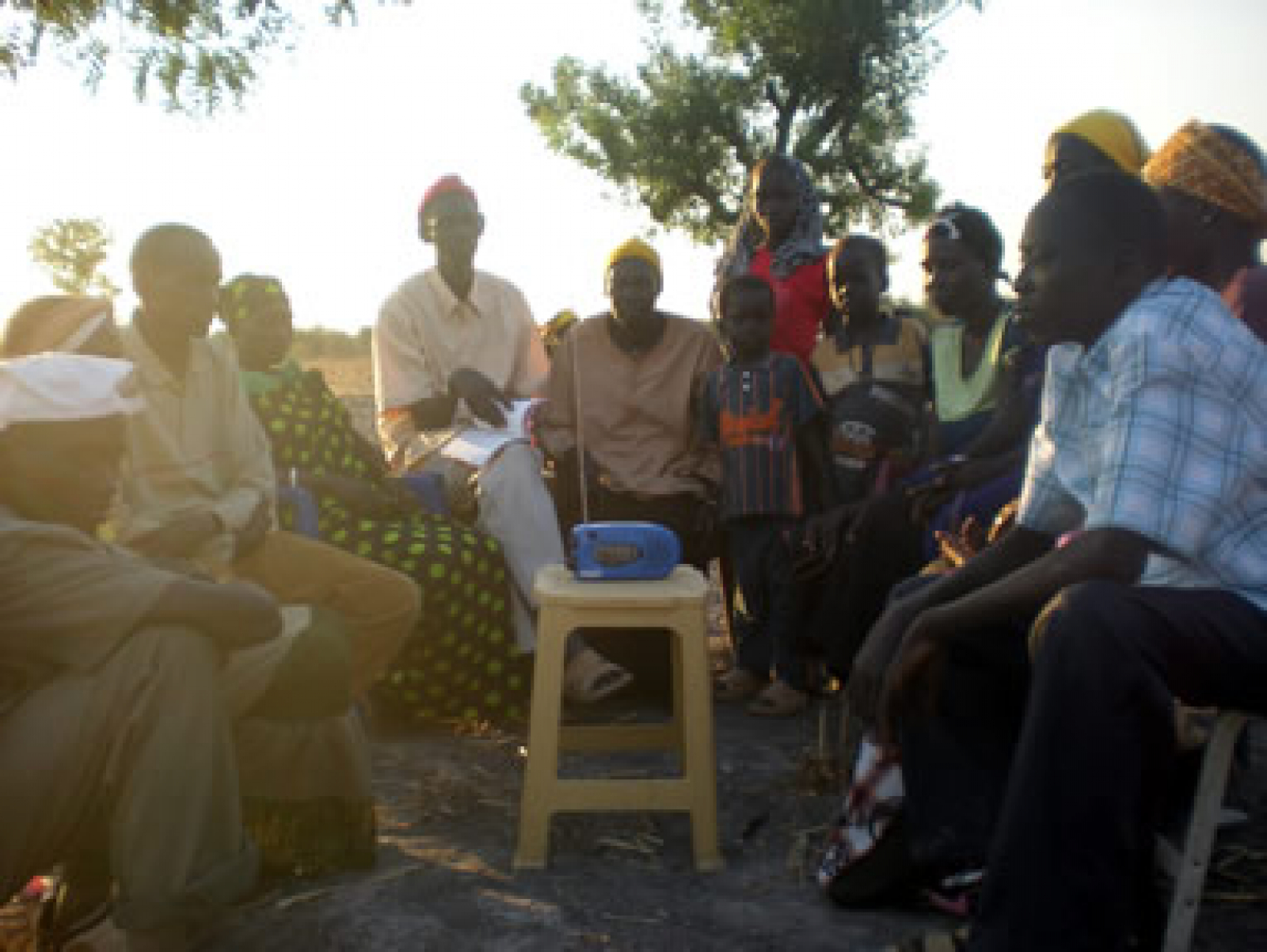
SHARE
A now completed distribution program by NDI has put more than 265,000 radios in the hands of Southern Sudanese and residents of the Three Areas since the end of 2007. For Sudanese across the Lakes, Unity and Warap states, the nearly 65,000 radio, distributed in partnership with CHF International s provide access to civic education that was difficult to deliver to mass audiences in the past.
While the radio distribution wrapped up in April, radio programming continues to feed a dialogue on issues important to the Sudanese people, particularly the national elections expected next year. Michael Rifer, who works on the program in Sudan for NDI, describes the radios’ impact in one community in Unity.
Late morning in Southern Sudan’s Unity state provides a stunning visual contrast: the gray flat earth punctuated by bursts of green trees, still vibrant from the not-too-distant rains, all weighted down by a cloudless, pale blue sky.
It’s beautiful, but it is hot.
As the cool air and long shadows of morning are slowly replaced by the violent heat of the noonday sun, men and women in the village of Leer begin to retreat to the cool of a scrap of shade. As the shadows shrink, they draw closer together, creating the forum for a daily ritual: friends and neighbors sharing tea, water and news of the day – gossip, the weather, or the price of a strong bull in the market. Yet as this country continues its recovery from more than two decades of conflict, and with national elections beginning to loom in its collective consciousness, frequently discussion turns to politics and Sudan’s political transition from war to peace.
In isolated communities like this one – far from main roads and large population centers – the impact of the radio distribution is clear. The little blue radios are a ubiquitous sight under shady palmetto trees and in front of the tin-roofed shops that line Leer’s unpaved streets. Although Leer was previously served by a community radio station – Naath FM 88.0 – its impact was hampered because most citizens had no way to listen to it. Likewise, NDI had no way to consistently reach the disperse, rural population and outlying villages with its civic education program. The introduction of the radios changed all that.
Let’s Talk, a radio program NDI produces in partnership with the Sudan Radio Service, isa weekly 30-minute broadcast that tackles issues of political transition, democracy and civic participation. With it, NDI organizes discussion groups around the programs that have generated greater disussion as the show has garnered a greater audience.
The program’s popular drama weaves a series of civic educational topics into the daily lives of characters Taban and Salama, as well as their friends, family and neighbors, in a fictional Southern Sudanese town. Since the radio show began in January 2007, more than 50 episodes of Let’s Talk have mirrored the evolving course of the country’s transition, including its interim governing institutions, constitutional framework, political processes and the rights, roles and responsibilities accorded to citizens in a democratic transition.
What makes Let’s Talk unique here in Leer, however, is the innovative partnership that has enabled the creation of what is essentially a community-wide listening group. Today, as the broadcast concludes, three young men – community radio reporter and host Simon Rica Taker, Isaac War of NDI, and Matthew Papuon of CHF – crowd into the small, but comfortable Naath 88.0 FM studio. In eloquent Nuer, the local language, Taker briefly recaps the major themes of the preceding Let’s Talk episode and implores his broadcast audience to call in and discuss the issues – the national elections in this case – with the assembled panel and the community at large.
Within seconds, the studio’s small blue cell phone begins jingling. Simon turns on the phone’s speaker and lifts it to the boom microphone hanging in front of him. While today’s program focused on a leader’s responsibilities and the importance of selecting responsible people to govern, it has clearly aroused citizens’ apprehensions about the election and the electoral process.
One man calls to express his concerns about the logistics of conducting an election in this remote part of Sudan: “The election is an important exercise, but we want the government to put some of the things in place before [the voting]; we need better access to road networks so that [the election] can be done successfully.”
Another caller encourages government officials to consider security: “We also need the government to put down some laws to protect the people before the election...to make sure security is granted for the voters and mobilizers to move freely!”
For the next hour, the calls come as soon as the previous one ends — men and women, more than a dozen in all.
Taker of Naath FM has no doubt about the impact that the radio distribution program has had on the ability of communities to access information. Indeed, call-in participants hailed from about a half dozen different communities within the station’s five county broadcast area in central Unity state.
“This program lets us share information with many communities,” he says. “Not just Leer County, but Koch County and even Guit County,” areas over 40 miles apart with paths that are largely impassable in the wet season. “Before the radio distribution they used to say ‘We enjoy the radio, but we don’t have enough radios here.’ Now they listen.”
Pictured Above: Sudanese citizens gather to listen to programming on radios distributed by NDI and CHF.
–
Published May 28, 2009


